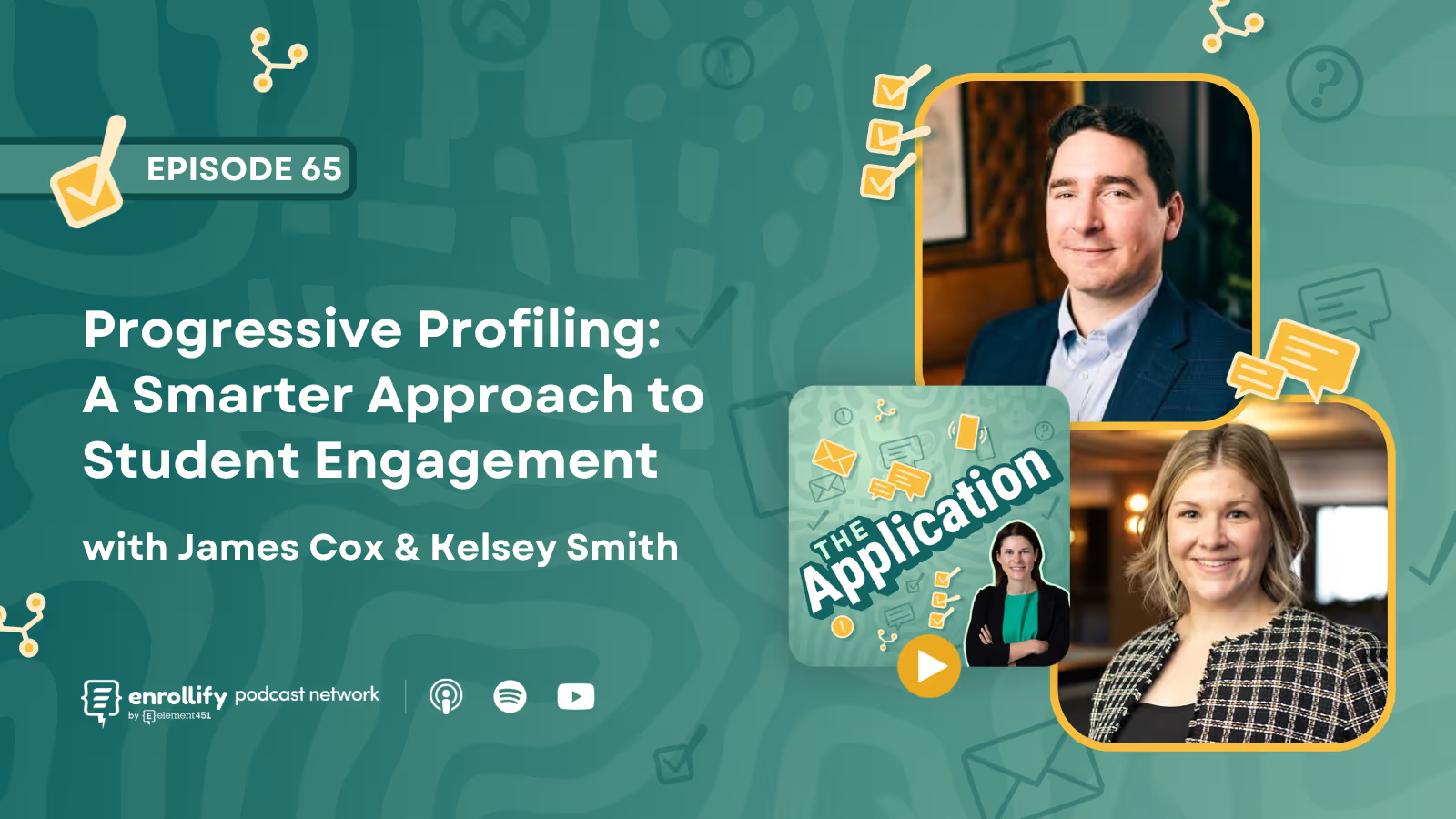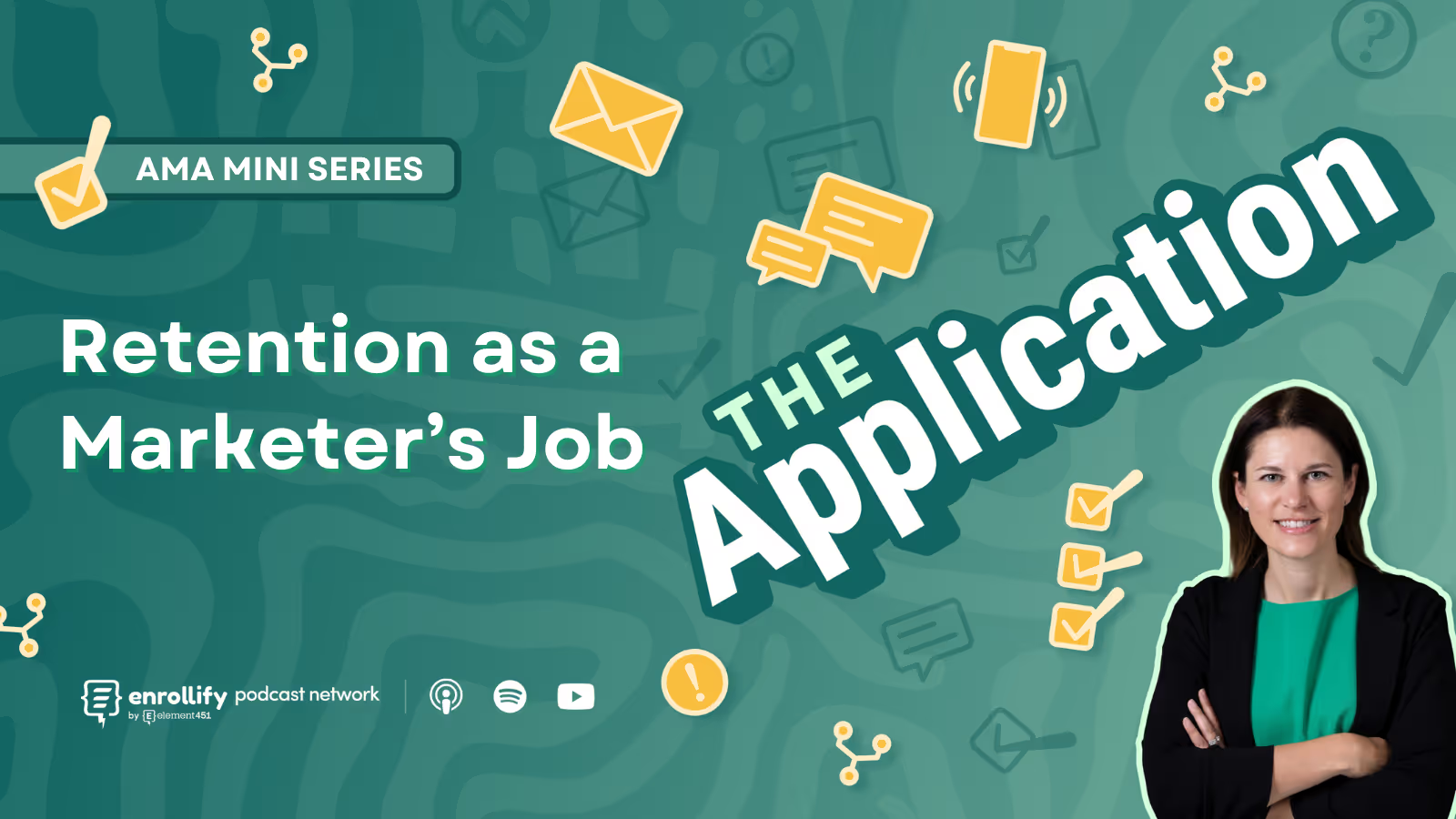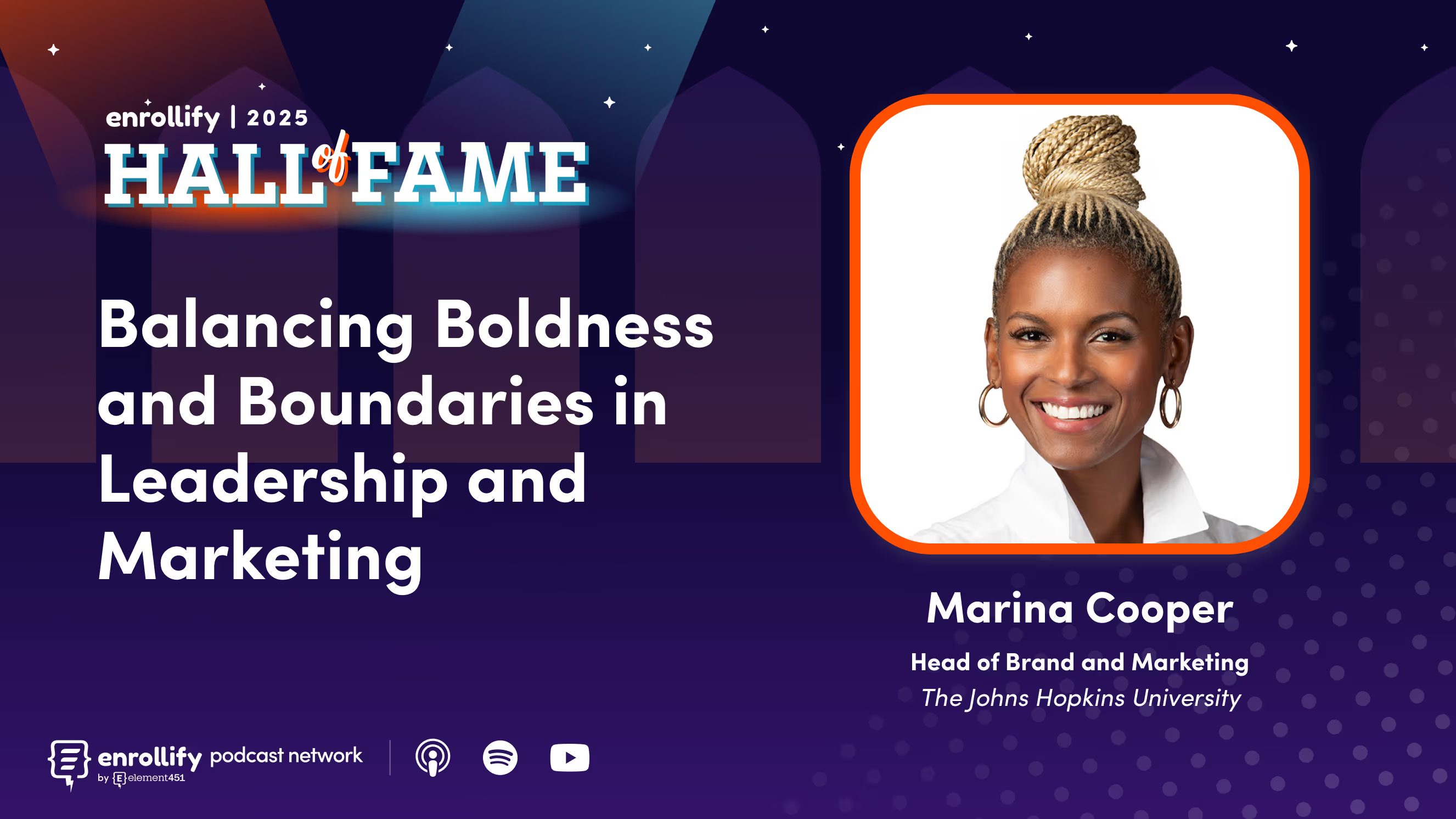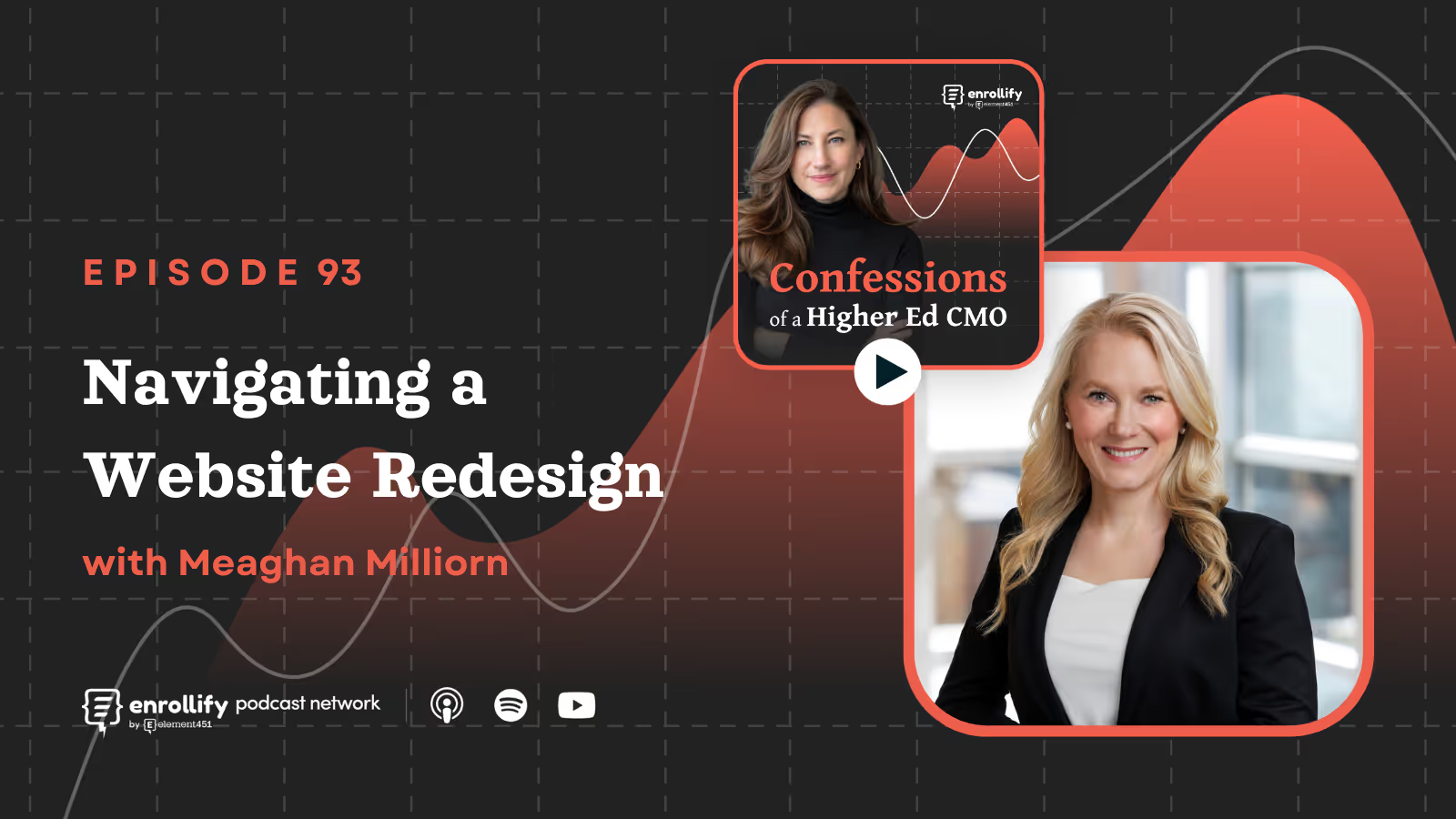About the Episode
Got a story to tell? An innovative idea to share? Fill out our guest nomination form and let's chat!
About the Episode:
Allison Tercio sits down with Kelsey Smith and James Cox from Purdue University's Mitch Daniels School of Business to explore how their team uses progressive profiling to strategically gather student insights over time. They discuss best practices for reducing form fatigue, using data for personalized outreach, and striking the balance between helpful and intrusive. If you’re looking for innovative enrollment marketing strategies, this episode is packed with actionable takeaways.
Key Takeaways
- Progressive profiling allows institutions to collect data over time rather than overwhelming students with long forms upfront.
- Form fatigue is real—only ask for essential details first and gradually build a richer student profile.
- Segmenting students early based on their intent level (e.g., “just exploring” vs. “ready to apply”) enables more effective communication.
- Dynamic content and automation help tailor outreach based on student interests, location, and program choice.
- Balancing personalization with privacy is key—framing personalization as a service rather than surveillance keeps students engaged.
- Recruiters play a crucial role in gathering insights via calls and emails that complement automated communications.
What is Progressive Profiling, and Why Does It Matter in Higher Ed?
Progressive profiling is a strategic approach to data collection where institutions gather small bits of information from prospective students over time rather than requiring them to fill out long, overwhelming forms. Instead of requesting every detail at once, Purdue’s Mitch Daniels School of Business starts with the basics—name, email, program of interest—and gradually builds a more detailed profile as the student engages further.
This method is particularly valuable in higher education enrollment marketing, as it prevents form fatigue while allowing institutions to personalize communications at the right moments in a student’s journey. The ultimate goal? More meaningful interactions that increase the likelihood of application and enrollment.
What Are the Most Valuable Data Points to Collect?
James Cox and Kelsey Smith emphasize the importance of distinguishing between essential data points and those that can wait. For example:
- Must-have upfront: Name, email, location, program of interest, and general intent level.
- Better collected later: Career goals, barriers to application, funding concerns, and competing institutions of interest.
By strategically phasing data collection, Purdue ensures they gather accurate and actionable insights while minimizing friction in the student experience.
How Does Progressive Profiling Work in Practice?
Once an initial request for information (RFI) form is submitted, prospective students are placed into targeted communication workflows. These workflows include:
- Follow-up forms with additional questions—introduced naturally after initial engagement.
- Recruiter outreach—where admissions staff gather qualitative insights via calls and personalized emails.
- Automated journeys—where email and SMS messages adjust dynamically based on a student’s responses and behaviors.
For instance, a student who selects “I’m ready to apply” in an early touchpoint will receive different messaging than someone who selects “just exploring.” This ensures students receive the most relevant information at the right time without unnecessary clutter.
How Do You Balance Personalization Without Crossing Into “Creepy” Territory?
A major concern with data-driven marketing is avoiding the “Big Brother” effect—where students feel like they’re being watched rather than helped. Purdue’s team ensures personalization feels natural by:
- Framing outreach as a service rather than surveillance—e.g., “We saw you expressed interest in X, here’s a resource you may find useful” rather than “We saw you clicked on X.”
- Spacing out data collection so that students gradually share more details as trust builds.
- Incorporating recruiter-led conversations that add a human element to data-driven communication.
This approach allows students to feel heard and supported rather than scrutinized.
What Results Has Purdue Seen from Progressive Profiling?
By implementing progressive profiling, Purdue has seen:
- Higher engagement rates as students receive content tailored to their interests.
- More applications started earlier in the enrollment funnel.
- Improved recruiter-student relationships through better data insights.
Additionally, segmentation based on program type (e.g., online vs. in-residence) has led to more effective messaging, ensuring students get the information most relevant to their journey.
How Can Other Institutions Get Started with Progressive Profiling?
For higher ed marketers looking to implement progressive profiling, James and Kelsey recommend:
- Start small and start now—identify 3-5 key data points and refine your initial RFI form.
- Use automation wisely—implement templates and workflows to streamline data collection and communication.
- Engage recruiters early—their insights are invaluable for understanding student needs and barriers.
- Think long-term—establish processes that allow for scalable personalization as your strategies evolve.
Connect With Our Host:
Allison Turcio
https://www.linkedin.com/in/allisonturcio/
https://twitter.com/allisonturcio
About The Enrollify Podcast Network: The Application with Allison Turcio is a part of the Enrollify Podcast Network. If you like this podcast, chances are you’ll like other Enrollify shows, too!
Some of our favorites include Mission Admissions and Visionary Voices: The College President’s Playbook.
Enrollify is made possible by Element451 — the next-generation AI student engagement platform helping institutions create meaningful and personalized interactions with students. Learn more at element451.com.
Attend the 2025 Engage Summit!
The Engage Summit is the premier conference for forward-thinking leaders and practitioners dedicated to exploring the transformative power of AI in education.
Explore the strategies and tools to step into the next generation of student engagement, supercharged by AI. You'll leave ready to deliver the most personalized digital engagement experience every step of the way.
👉🏻 Register now to secure your spot in Charlotte, NC, on June 24-25, 2025!















